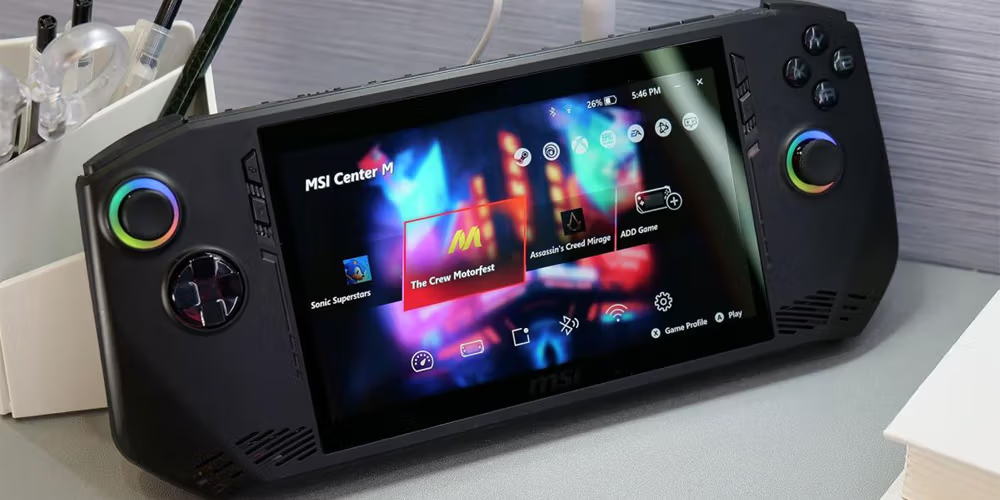Intel Enhances Support for Handheld Gaming Consoles

Intel is making significant strides to bolster its support for handheld gaming consoles. As the demand for these compact devices continues to rise, the chipmaker is keen to establish a strong foothold in this burgeoning market. Competing against AMD, which has introduced its Z1 and Z1 Extreme chips for popular devices like the Lenovo Legion Go and Asus ROG Ally X, Intel is taking proactive measures. The company is not only providing development kits but also facilitating access to specialized staff for developers working on next-generation chip technology.
Intel Seeds Prototype Handheld PCs to Game Developers
Intel is actively enhancing its support for manufacturers of handheld gaming consoles, including notable products like the MSI Claw 8 AI+ and Asus ROG Ally X. In a recent conversation with Laptop Mag, Robert Hallock, Intel’s Vice President and General Manager of AI and Technical Marketing, revealed that the company is distributing prototypes of handheld gaming consoles to game developers. This initiative aims to foster innovation and ensure that developers can create optimized gaming experiences for these devices.
To further assist manufacturers, Intel is offering access to its team of specialists. This collaboration is designed to help console makers develop performance profiles that can optimize their devices for gaming. Additionally, Intel is providing developers with development kits in anticipation of the launch of its next-generation CPUs. This comprehensive support strategy underscores Intel’s commitment to the handheld gaming market and its desire to empower developers to create cutting-edge gaming experiences.
By seeding prototypes and offering technical assistance, Intel is positioning itself as a key player in the handheld gaming sector. The company’s efforts are likely to lead to a new wave of innovative gaming consoles that can compete effectively in a market that is rapidly evolving.
Intel’s Panther Lake Chips Could Offer Improved Memory Customization
Intel’s latest advancements in chip technology are set to revolutionize the handheld gaming experience. The company recently launched its Arrow Lake (Core Ultra Series 2) processors in October 2024, and it is already testing its next-generation Panther Lake CPUs. According to Hallock, these new Panther Lake chips will differ significantly from their predecessors, particularly in terms of memory configuration. Unlike the Lunar Lake series, Panther Lake chips will not include system memory on the CPU package. This design choice allows manufacturers to offer customized RAM configurations, which can enhance performance and user experience.
At the recent CES 2025, several handheld devices equipped with the Arrow Lake H-series chips were showcased, demonstrating improved performance compared to models using Lunar Lake CPUs. These advancements are expected to set a new standard for mobile devices, including laptops and handheld gaming PCs. While Intel has not provided a specific timeline for the launch of the Panther Lake chips, the anticipation surrounding their release is palpable.
The ability to customize memory configurations could be a game-changer for handheld gaming consoles. It allows manufacturers to tailor their devices to meet the specific needs of gamers, potentially leading to a more immersive and responsive gaming experience. As Intel continues to innovate, the future of handheld gaming looks promising, with enhanced performance and customization options on the horizon.
Competitive Landscape and Future Prospects
The handheld gaming market is becoming increasingly competitive, with major players like AMD and Intel vying for dominance. AMD’s Z1 and Z1 Extreme chips have already made a significant impact, powering popular devices that cater to gamers seeking portable solutions. In response, Intel is ramping up its efforts to ensure that its offerings are not only competitive but also innovative.
Intel’s strategy involves not just the development of powerful chips but also fostering a collaborative environment with game developers. By providing prototypes and technical support, Intel is encouraging developers to create games that fully utilize the capabilities of its hardware. This approach could lead to a richer gaming ecosystem, where developers can push the boundaries of what handheld consoles can achieve.
Looking ahead, the success of Intel’s Panther Lake chips will be crucial. If these chips can deliver on their promise of improved performance and customization, they could significantly enhance the appeal of Intel-powered handheld gaming devices. As the market continues to evolve, Intel’s commitment to innovation and support for developers will be key factors in determining its success in the handheld gaming arena.
Observer Voice is the one stop site for National, International news, Sports, Editor’s Choice, Art/culture contents, Quotes and much more. We also cover historical contents. Historical contents includes World History, Indian History, and what happened today. The website also covers Entertainment across the India and World.

